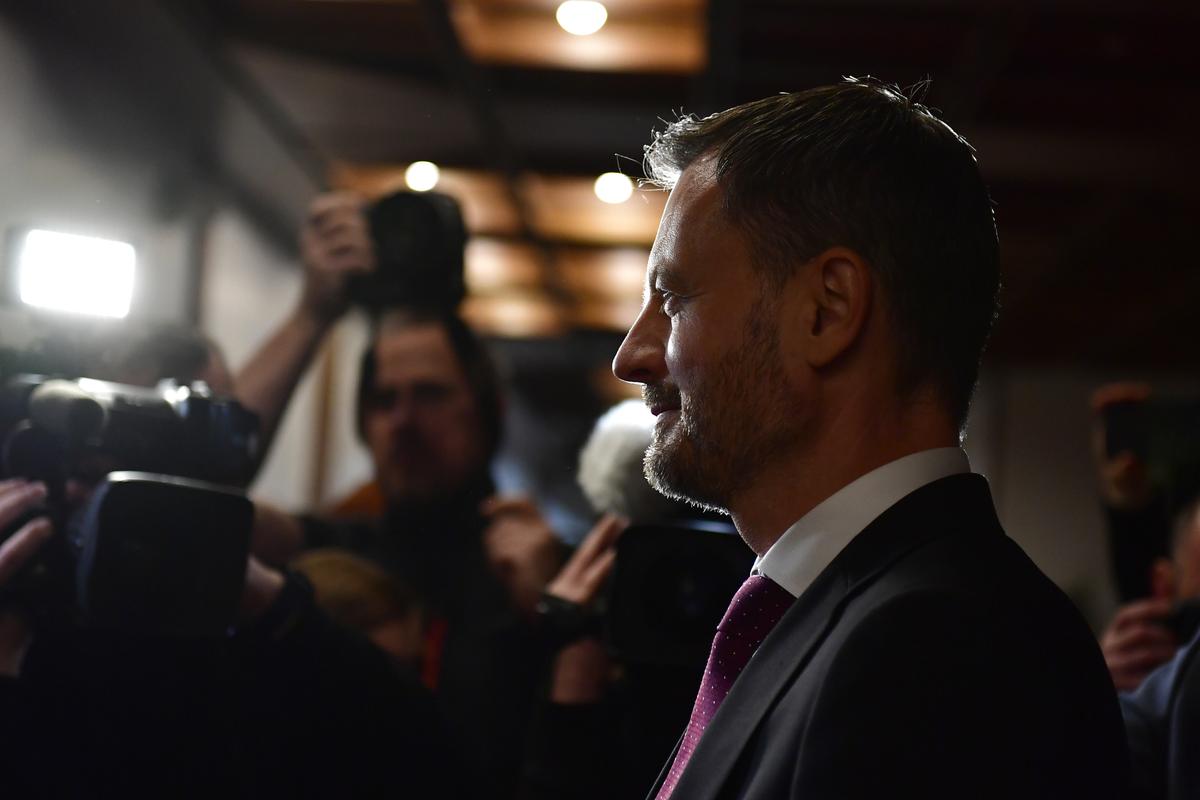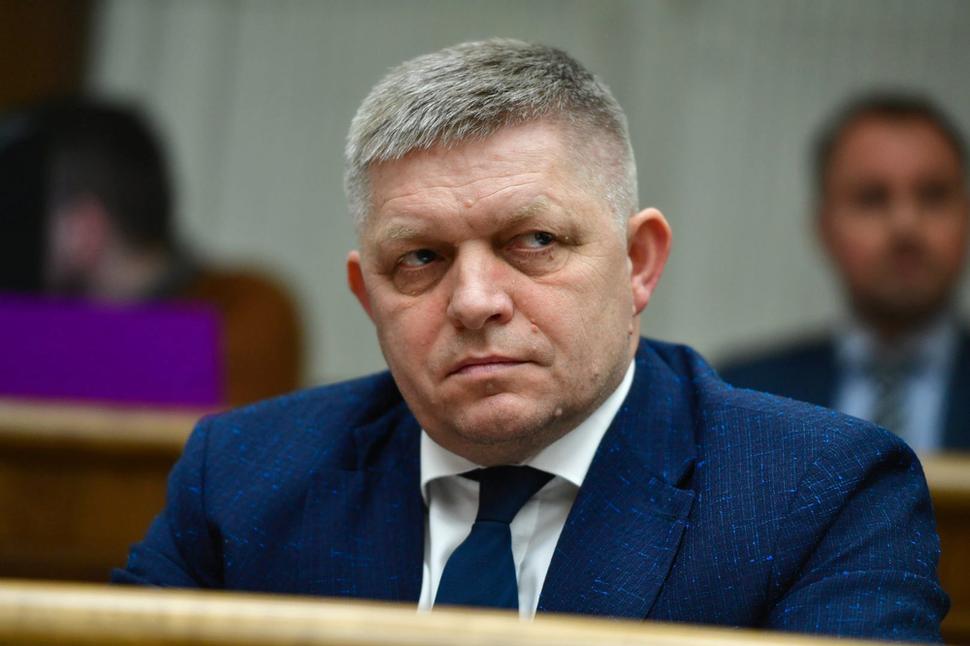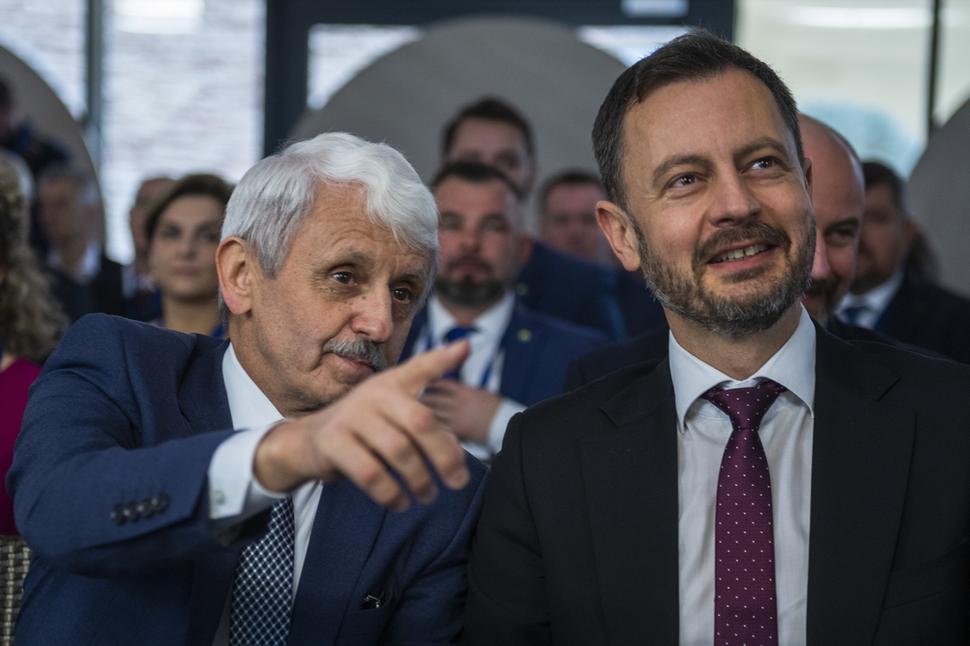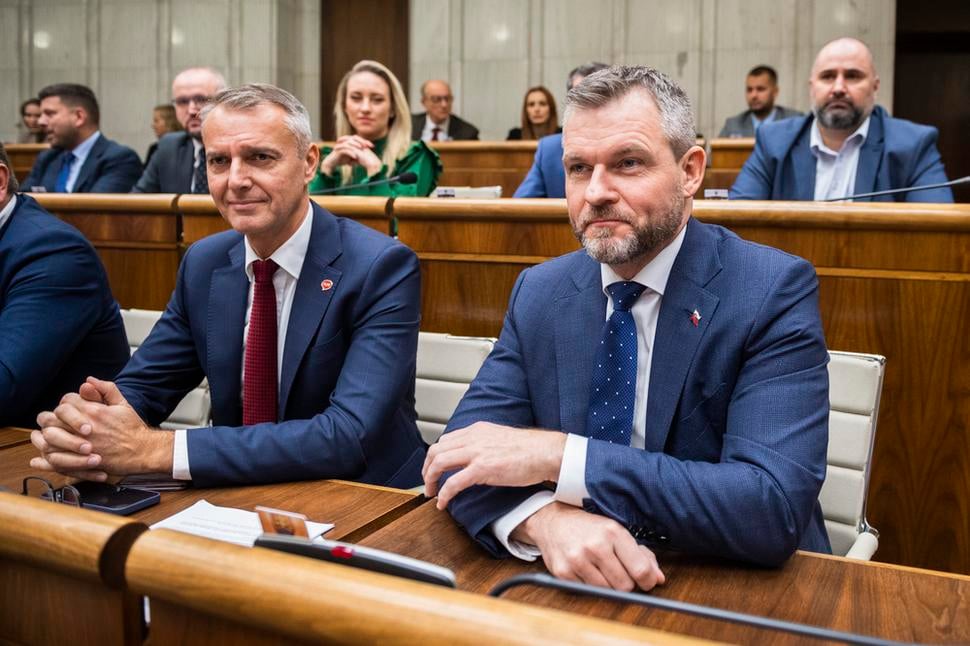Slovakia’s interim prime minister, Eduard Heger, maintains that snap elections have no place in a democracy – a view that Slovakia is very likely to test this year after parliament brought his government down in December.
“We’re against snap elections,” Heger stated his party’s position at the time.
Ordinary People and Independent Personalities (OĽaNO), the largest coalition party that Heger is a member of, argues that a democratic government should end its term after four years, not before.
“Our constitution reads that a parliamentary election shall be held every four years,” Heger responded to a question about why his party opposes snap elections.
OĽaNO rode to power in 2020 on a popular anti-corruption platform, ending the eight-year rule of a succession of Smer-led governments that had been tarnished by wide-scale corruption, links to organised crime, and the murder of journalist Ján Kuciak and his fiancée Martina Kušnírová.
Despite initial hopes, OĽaNO was forced to replace its conflict-seeking and stubborn leaderIgor Matovič as prime minister after only a year in power – a difficult period marked by the coronavirus pandemic and internal wrangling between various coalition partners.
That move was not enough, however, to save the OĽaNO-led government from losing its constitutional majority and, subsequently, a majority in the 150-seat house when on December 15 most lawmakers (78) backed a no-confidence motion against Heger’s government.
To replace the current OĽaNO-led interim government with limited powers, appointed by President Zuzana Čaputová in mid-December, the country’s political leaders would have to garner the necessary 90 votes in parliament to change the constitution and, then, pass another bill with the same quorum to actually make a snap election happen. Yet, they do not possess the votes at present.
Still, a snap election seems to be a preferred solution to Čaputová’s caretaker government or a Heger 2.0 government among most political parties – except for OĽaNO of course. The ruling party fears the return of ex-prime minister Robert Fico’s Smer party to power and what they reckon will be an attempt to halt the numerous investigations into high-profile corruption and prosecutions of former high-ranking public servants and oligarchs.
Despite its current opposition, OĽaNO has not always been against snap elections – a tool used three times prior to a 2021 Constitutional Court decision that established the requirement for parliament to pass an amendment about shortening a parliament before any future snap election could be held.
In 2018, several weeks after the journalist’s murder, Matovič announced in front of the cameras that most people wanted a snap election while waving a sheet of paper around that showed a public poll demanding such a thing.
“We stand by the people demanding a snap election, a celebration of democracy,” Matovič claimed. Heger, an MP at the time, stood next to OĽaNO’s leader in silence.
While many experts do not question the legitimacy of a snap election, and even see it as a way out of the current chaotic governance and uncertainty, they warn at the same time that its outcome could steer Slovakia, which marks 30 years of its independence in 2023, away from the EU’s core.
Three times a premier
To avert a snap election, Heger is trying to find 76 lawmakers who would be willing to support his new government until early 2024, when the next parliamentary election is scheduled to be held. When asked by the Sme newspaper if his efforts are likely to bear fruit, Heger was brief: “We’ll see.”
By 2024, Heger believes he will have been able to show people the first results of his cabinet’s reforms financed by the €6.3 billion from the EU’s mammoth post-coronavirus recovery fund, and deliver financial aid worth €3.5 billion to people and businesses struggling from the energy crisis. In this way, he is hoping to prevent Fico, whose political party is now the country’s second most-popular party in opinion polls, from taking power.
Fico, a three-times ex-prime minister after winning snap elections in 2006 and 2012, is today under investigation for his alleged involvement in and establishment of an organised crime group, and for the alleged use of sensitive tax information against his opponents, including Matovič. Criminal charges, however, were dropped following a surprising decision by the prosecutor general in November.
Grigorij Mesežnikov, a political scientist for the Slovak Institute for Public Affairs, is sceptical about Heger’s chances. “It’s beyond all human endeavour given the fall of his government,” he told the SITA news agency.
Heger might not be in this invidious position had he actually sacked his party leader Matovič as finance minister last summer – a condition laid down by the Freedom and Solidarity (SaS) party for it to remain in the coalition.
SaS got its wish on Matovič after it had left the coalition, when its proposal for a no-confidence vote against Heger’s cabinet was ultimately successful. Heger, as interim prime minister, eventually agreed in late December to remove Matovič from his cabinet in exchange for SaS’s support for the 2023 state budget. Without it, Heger’s government would not have been able to increase salaries or roll out its €1.2 billion “pro-family” package, among other things.
Moreover, it was SaS leader Richard Sulík who initially advised Heger to try to find 76 lawmakers to support a potential third government, hinting that SaS might even back it. Ultimately, though, Sulík changed his mind after some of his MPs expressed disapproval with the idea. “I then said to Heger to forget about it for now,” Sulík said.
Even with its two coalition partners, Za Ľudí and Sme Rodina, OĽaNO does not have the necessary 76 lawmakers to back up Heger’s plans. In addition, Sme Rodina’s leader Boris Kollár has said he sees a snap election as a better solution to the current political stalemate in Slovakia.
“We’ll provide votes for [Heger’s] new government under the condition that a snap election will take place by September at the latest,” Kollár said.
Sme Rodina, which has threatened to leave OĽaNO-led governments on several occasions over the past three years, submitted a constitutional bill last summer that would shorten a parliament, but the political parties have taken a time-out until late January from talks about supporting the bill and snap election.
If the bill that changes the constitution fails to win 90 votes in parliament in January, lawmakers could only debate the same bill in six months’ time at the earliest.
Smer’s referendum, Čaputová’s decision
Yet the Smer-led opposition has up its sleeve another possible way to get the constitutional change in question adopted.
A 9-million-euro opposition-initiated referendum on shortening a parliament is set to take place on January 21, just three days before the first parliamentary session of the year.
The electorate will, therefore, be the first to have its say on the constitutional change, even if the referendum is not expected to be valid due to a low turnout. Only 37 per cent of people said they will definitely cast a vote, according to an AKO poll from early December.
President Čaputová – who agreed to, then called the referendum – and coalition politicians said weeks ago they would ignore it. The president claims Smer is misusing the referendum for its own political ends, while others see it as merely a waste of money.
In Slovak history only one referendum has exceeded the necessary 50-per cent threshold. That concerned joining the EU in 2004.
Yet if Smer’s referendum were to succeed, its outcome would be legally binding, meaning that any future Slovak parliament could be dismissed anytime via a referendum or a resolution adopted by just 76, not 90, lawmakers in the 150-seat parliament, which is different from the proposal waiting to be voted on by parliament.
Conversely, if the referendum becomes invalid or political parties fail to agree by the end of January (the deadline set by the president) on holding a snap election, or Heger has not got together a list of 76 lawmakers to support his next cabinet by then, President Čaputová could appoint her own caretaker government.
In early December, Čaputová said she would like to avoid this scenario. “In addition to your own responsibility, you are also responsible for the executive, so I can reassure everyone who is afraid of this model from the point of view that I covet it, I really am not,” the president asserted.
In her New Year’s Address, she said an early election, apparently, awaits Slovakia.
Unlike SaS, other political parties said they would not back an interim, caretaker government. The Slovak public does not seem much in favour of it either. A Focus poll in December shows only 22 per cent would support a caretaker government, a concept Slovakia has no experience with.
Čaputová, who is expected to announce in the spring her decision on whether she will run for re-election in 2024, would probably not want to risk a misstep in the form of appointing a government of technocrats unsupported by either parliament or the people.
If Čaputová – the country’s most trusted politician – decides on another presidential run, she would be setting out on the campaign trail round about the same time as political parties ahead of any snap election at some point this year.
The Dzurinda project
In fact, up to 59 per cent of people would prefer to see any snap election take place before the summer of 2023, with only 19 per cent preferring an election in spring of 2024, according to the above-cited Focus poll.
Even Sulík now says his party does not rule out supporting a snap election, which the party considers a last-resort. “My personal assumption is that all parties in parliament will agree on a snap election in September,” he told Sme, “Everyone will be equally slightly dissatisfied.”
A snap election would force small centrist and centre-right parties to create coalitions to have any chance of entering parliament, according to Mesežnikov.
Mesežnikov also points to ex-prime minister Mikuláš Dzurinda’s political project that has been talked about in the media since the autumn of 2021. At the beginning of December, Dzurinda spoke at a congress of Spolu, a small non-parliamentary party, where he mentioned that he wants to create a political alternative to Smer, the far-right parties and populists, and that the project would aim to deal with the country’s problems by bringing together conservatives and liberals.
“Today it is about not allowing ourselves to be pushed out of the developed world by our stupidity, cowardice and weakness,” said Dzurinda, a man who introduced key reforms in the early 2000s but whose time in office was also tarnished by political corruption.
Political scientists agree it is not clear what Dzurinda’s ambitions are and how far advanced his plans are. “There is talk of Dzurinda’s project, but we see nothing happening,” political scientist Jozef Lenč said in a podcast.
Based on his statements about bringing all true democrats, conservative and liberal, together, Heger appears to have a similar ambition to Dzurinda. It’s unclear how Heger thinks he can achieve this when his party boss, Matovič, has repeatedly attacked liberals, the president, and the LGBT community in recent days.
‘Little Hungary’
Like Dzurinda and some in power, experts also express fear that any snap election could shift Slovak foreign policy and push the country back to the peripheries of the EU.
A similar situation occurred in 1994 when Vladimír Mečiar’s HZDS party won the first snap election held in Slovakia, whose semi-authoritarian rule earned Slovakia the name of “black hole of Europe”.
Today, sociologist Michal Vašečka claims a government choosing the Hungarian path could possibly end the current period of instability in Slovakia, hinting at Fico’s Smer being part of such a government. Since the start of Russia’s invasion of Ukraine, Fico has rejected military aid for Ukraine and criticised the sanctions against Russia. Last summer, Ukraine put Fico on a list of high-profile Westerners spreading Russian propaganda.
Milan Nič of the German Council on Foreign Affairs told the Pravda daily that Fico is so out of touch with mainstream EU politics that he would be seen as extreme in any government. “There are fears that Slovakia could become a ‘little Hungary’ after the next election,” he said.
It is the Hlas party, led by ex-prime minister Peter Pellegrini, who is likely to win the next election. His party, which split from Fico’s Smer in summer 2020, has topped public opinion polls for a long time. Holding a different position on the war in Ukraine from Fico, Pellegrini claims he cannot imagine cooperation with the Smer leader if he were part of his government. Difficult to read, it is yet to be seen what position Pellegrini would actually take post-election.
Meanwhile, former prime minister Iveta Radičová, whose government collapse in 2011 was followed by a snap election, said in a pre-Christmas radio interview that the next government has to deal with a very serious problem on top of all the other problems – the continuing decline in people’s living standards.
Experts stress that the “Tatra Tiger”, Slovakia’s nickname in the noughties due to its high GDP at the time, cannot start growing economically strong again without further reforms, a halt to the brain drain and support for higher immigration.
“While there is a struggle for survival of power in the parliament, there is a struggle for survival in our lives,” Radičová said.
This story was produced in partnership with Reporting Democracy, a cross-border journalism platform run by the Balkan Investigative Reporting Network.


 PM Eduard Heger (OĽaNO) arrives at the parliament before the vote on the motion of no confidence in the government in Bratislava on Thursday, December 15, 2022. (source: TASR - Jaroslav Novák)
PM Eduard Heger (OĽaNO) arrives at the parliament before the vote on the motion of no confidence in the government in Bratislava on Thursday, December 15, 2022. (source: TASR - Jaroslav Novák)
 Interim PM Eduard Heger (OĽaNO) with his wife Lucia on the plane during the flight to the funeral of Pope Emeritus Benedict XVI, which took place in St. Peter’s Square in Vatican City on January 5. (source: TASR – Jaroslav Novák)
Interim PM Eduard Heger (OĽaNO) with his wife Lucia on the plane during the flight to the funeral of Pope Emeritus Benedict XVI, which took place in St. Peter’s Square in Vatican City on January 5. (source: TASR – Jaroslav Novák)
 Robert Fico (Smer-SD), Member of the National Assembly of the Slovak Republic, during the 78th session of the National Assembly of the Slovak Republic on December, 15, 2022 in Bratislava. (source: TASR – Jakub Kotian)
Robert Fico (Smer-SD), Member of the National Assembly of the Slovak Republic, during the 78th session of the National Assembly of the Slovak Republic on December, 15, 2022 in Bratislava. (source: TASR – Jakub Kotian)
 Mikuláš Dzurinda (L) talks to PM Heger (R) during the meeting of the Together – Civic Democracy party to review the municipal and regional elections, in Senec, on December 10, 2022. (source: TASR – Jaroslav Novák)
Mikuláš Dzurinda (L) talks to PM Heger (R) during the meeting of the Together – Civic Democracy party to review the municipal and regional elections, in Senec, on December 10, 2022. (source: TASR – Jaroslav Novák)
 MPs Richard Raši (L) and Peter Pellegrini (R) before the vote on the motion of no confidence in the government during the 78th session of the parliament in Bratislava on December 15, 2022. (source: TASR – Jaroslav Novák)
MPs Richard Raši (L) and Peter Pellegrini (R) before the vote on the motion of no confidence in the government during the 78th session of the parliament in Bratislava on December 15, 2022. (source: TASR – Jaroslav Novák)